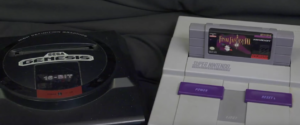For seemingly as long as there have been gaming consoles, there have been console wars. Much like the battle between the Xbox One and the Playstation 4 today, in the past there have been console after console battling it out for dominance of the market.
In the late 80’s into the early 90’s, Nintendo had a 90% market share in gaming. Atari was virtually dead, Colecovision and Intellivision didn’t survive the 1983 game crash, and the Sega Master System made virtually no dent in the US market. Nintendo was the top dog, until the Sega Genesis (MegaDrive internationally) was released to the US market, and began to take dominance.
The reason? The Genesis was a 16 bit console, while the others were 8 bit machines. What did this mean? In the most basic terms, more computer power for more advanced game visuals and gameplay. The end result was something known to the gamers of the era as “The Bitwars”, the battle between the NES and the Genesis. This later evolved into a battle between the slightly older Sega Genesis and the then new Super NES.

The SNES was a more powerful console, but the Genesis had a much faster CPU. While speed doesn’t always mean better, and the other components in the system have to also be capable to make a good game console, this was used(in the buzz term “blast processing” in advertising as an advantage of the Genesis for much of it’s life.
I do personally remember this time period fondly. I had a Genesis as a kid, while most of my friends had Super Nintendo consoles. I could see, when I would play at their houses, how good the SNES was, there was no denying that, but I did love my Genesis and the games I had for it. Of course, I got involved in the arguments like everyone did about which system is better, but in the end, it didn’t matter – by 1995 to 1997 they would be replaced with the Sega Saturn and the Nintendo 64, with the Sony Playstation coming in to throw a wrench into the works, so to speak.
For now though, I share with you the point of this article: James Rolfe (of Angry Video Game Nerd fame) sharing his take on the Bitwars, both from his own perspective as a 10 year old, and his own now as a grown adult. The video has some funny elements, some serious notes, and some great system comparisons, and for anyone interested in gaming history, it is worth a watch.
I have a few disagreements with him, which I will share below, but I do think it worth saying I agree fully in his ending statements.
Enjoy!
At about 6:30, when James is going over the technical specifications of the systems and says he can’t find many comparisons, this is really due to the nature of the games designs, and how CPU’s work. In the end, for raw data, they were comparable, but even if one was truly more capable, a game is unlikely to be designed for a game console in such a way that it’s speed is dependent on CPU purely, and is not an element of the game design itself.
When comparing controllers around 12 minutes in, James talks about an optional 6 button controller for the Genesis, but disregards it, focusing only on the standard controllers. That’s fine, but at about 14:30 in, when comparing backwards compatibility, he uses a 3rd party NES / Famicom adapter for the SNES as a point in that the SNES has better backwards compatibility, when combined with the Super Game Boy. This seems a little biased, and odd that he would allow a 3rd party device to bring up the rating of the SNES in this category, but wouldn’t allow a 1st party controller to help the Genesis rating when comparing the Genesis and SNES controllers.
At about 16 minutes in, James compares the SuperFX based games (Star Fox, for example) to the 32X adapter the Genesis had, saying the SNES was more capable since you didn’t need an addon. What he seems to ignore is that the SuperFX games had an additional processor in them, much in the same way the 32x added it’s own additional processor to the Genesis, and while I do agree the SNES had a more elegant expansion capability in this regard, he treats the 32x as something different, when in function it’s a similar approach.
Lastly, when he compares sound, I just have one person gripe in that the SNES sound is always “in the background” so to speak.. it never sounds fully focused, and is usually full of a bit more reverb than I like. Still, it is more orchestral than the Genesis could produce, and I do adore many track on the SNES, including the music of Final Fantasy 3 US, and still find it enjoyable.
That’s all I have to say about this though. Take it easy, and happy gaming!
